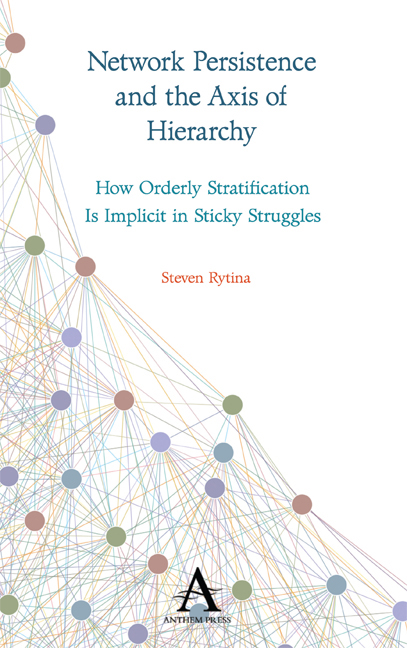 Network Persistence and the Axis of Hierarchy
Network Persistence and the Axis of Hierarchy Book contents
- Frontmatter
- Contents
- List of Illustrations
- Preface
- Chapter One Sticky Struggles: The Unified Pattern of Social Ranks Inherent in Networks
- Chapter Two Foundations of Cacophony
- Chapter Three Knots of Regularity
- Chapter Four Hierarchy: Inevitable but Inevitably Messy
- Chapter Five The Inevitable Emergence of Stratification
- Chapter Six Scaling Intergenerational Continuity: Is Occupational Inheritance Ascriptive After All?
- Chapter Seven Taming the Mobility Table
- Chapter Eight Is Occupational Mobility Declining in the United States?
- Chapter Nine The Continuum of Class over Time: Deconstructing Imposed Class to Uncover Empirical Classes
- Chapter Ten Concluding Reflections
- Appendix Why Robust Attraction Is (Effectively) Inevitable for Mobility Data
- Index
Chapter Three - Knots of Regularity
Published online by Cambridge University Press: 30 April 2020
- Frontmatter
- Contents
- List of Illustrations
- Preface
- Chapter One Sticky Struggles: The Unified Pattern of Social Ranks Inherent in Networks
- Chapter Two Foundations of Cacophony
- Chapter Three Knots of Regularity
- Chapter Four Hierarchy: Inevitable but Inevitably Messy
- Chapter Five The Inevitable Emergence of Stratification
- Chapter Six Scaling Intergenerational Continuity: Is Occupational Inheritance Ascriptive After All?
- Chapter Seven Taming the Mobility Table
- Chapter Eight Is Occupational Mobility Declining in the United States?
- Chapter Nine The Continuum of Class over Time: Deconstructing Imposed Class to Uncover Empirical Classes
- Chapter Ten Concluding Reflections
- Appendix Why Robust Attraction Is (Effectively) Inevitable for Mobility Data
- Index
Summary
The goal of this chapter is to sketch out a conceptual framework for capturing stratification while trying to evade the pitfalls that insure cacophony. The centerpiece is an account of social structure or social regularity based on network imagery and is called massively parallel accumulating interaction or, for short, MPAI.
Solving the puzzle requires a delicate balance. Any account of stratification rests on some account of social structure— of the concepts that shape the impersonal givens of collective life. Any such account must be rich in primitives, like action, agency, constraint, rule, and resource. MPAI must also offer these. However, the challenge of minimalism is to provide such primitives while somehow leaving open the nature of the rules by which inequality is reproduced.
A short list of conceptual necessities would include social cohesion or order, work, and property and authority. Contrasting conceptions of these are central sources of cacophony. Three network concepts, sticky networks, divided labor, and exclusive, repetitive gatherings will be offered as alternatives. These satisfy the minimalist program of not privileging specific rules, constitutional charters, or comparable particulars. Yet they are adequate to derive stratification as a collective pattern.
To anticipate stable inequality in the absence of any binding charter might seem to violate principles that appear to be beyond rational dispute. To put it as a question, how could stability be presumed if no binding charters are allowed? However, MPAI provides an alternative basis for anticipating stable patterning— widely distributed, continually self- regenerating inertia inherent in social learning. Decentralized inertia provides a source of “structure” that is an alternative to committing to one or another mutually exclusive accounts of an ultimate institutional core, regulating principles, or the like.
Inertia alone might be adequate to account for social regularities. However, inertia imposes no limit on the variety carried forward by the massive parallelism of the network conception.
In contrast, many theoretical programs put forward additional propositions that confine social action to particular forms, kinds, or patterns. By design, MPAI accommodates these. However, any of these are added as amendments. The common logical form consists of additional assumptions that limit action, in contrast to the strict eschewal of any limits with MPAI.
- Type
- Chapter
- Information
- Network Persistence and the Axis of HierarchyHow Orderly Stratification Is Implicit in Sticky Struggles, pp. 51 - 90Publisher: Anthem PressPrint publication year: 2020


